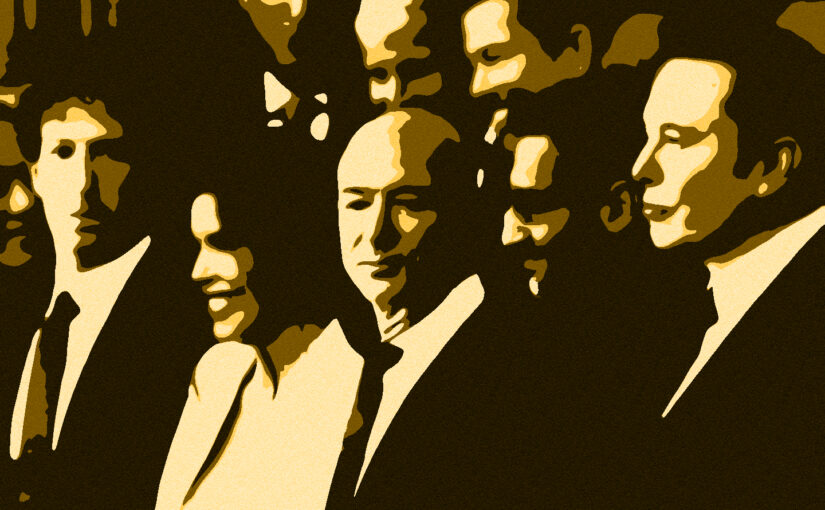(1,101 words, 6 min read time)
Sometimes I encounter a photograph from American history that burns itself into my brain, like the floaters you get from glimpsing at the sun too long.
To me, these images represent the best and worst of our national spirit. They’re often more obscure than, say, Alfred Eisenstaedt’s V-J Day in Times Square or Dorothea Lange’s Migrant Mother, but they are no less iconic or haunting.
For instance, I love the photo of Margaret Hamilton, a pioneer of programming, standing beside the towering stack of code in 1969 that brought NASA astronauts to the moon. It’s a reminder that, while glory often goes to the explorers, it’s the ship builders, who often exist on the margins, that make their journeys possible.
Similarly I’ll never forget the first time I saw the 1892 photo of two Michigan Carbon Works men standing on top of a mountain of bison skulls. Few photos do a better job representing the heedless slaughter of westward expansion, the callousness with which we as a country starved and displaced indigenous Americans.
There’s another photo that’s entered my head canon recently. Like you, I’m trapped in the amber of the moment it represents, so I don’t know if historians will regard it as prophetic as I do. But for me, it’s the bursting bulb at the end of our thermometer—an indication that our nation’s fever has gone through the roof.
On January 20th, 2025, Donald Trump was inaugurated as the 47th president of the United States. Photographed by Julia Demaree Nikhinson, in the front row of the ceremony were Mark Zuckerberg (CEO of Meta), Jeff Bezos (CEO of Amazon), Sundar Pichai (CEO of Google), and Elon Musk (CEO of X). Elsewhere off-camera were Tim Cook (CEO of Apple) and Shou Zi Chew (CEO of TikTok) padding out the numbers with their modest billions. Altogether their net worth is roughly a trillion dollars, rivaling the net worth of all but about 40 countries.
These are the Technocrats, the robber barons of the technological era. Their social media platforms, web hosting services, and streaming channels hold our attention in captivity. Less innovators than conquistadors, they have subdued every competitor and cornered every market. And here they were, taut smiles as they stood shoulder to shoulder with their last remaining rivals.
It was unclear to me if they were at the inauguration to be his courtiers or his puppet masters. But as they stood in places more prominent than Trump’s own cabinet picks, one thing was for certain—a fact we have always known but have chosen to ignore for half a century.
The gatekeepers are not on our side.
A couple of years ago, I was reading Dan Simmons’s novel The Fall of Hyperion, in which human civilization has expanded into the stars. People traverse the galaxy through portals called farcasters, which make interplanetary travel as easy as stepping through a door frame.
But these portals come with a price. They were created by the TechnoCore, a collective of sentient AI programs that had seceded from human servitude. In theory, the farcasters were their peace offering, but later we learn they were a fishing lure. It turns out, each time a person steps through a farcaster, the TechnoCore is hijacking their neurological hardware, using it to accelerate its own processing ability in its quest to build the Ultimate Intelligence.
When I read The Fall of Hyperion, I couldn’t help but think about the persistent paranoia we’ve had about the internet since its birth. I was ten-years-old when I first logged onto Prodigy, one of the original dial-up ISPs. At the time, it was magic. I could enter a forum and chat with stranger in other continents. I could orchestrate and share my own MIDI files like a schlocky Millennial Mozart. I could publish stories and essays and poems instantly, the envy of historical author before me, only my works of great literature came with tacky Looney Tunes animated GIFs in the background. And when I wanted to, I could get lost on an endless sea of knowledge, adrift in the luminous synapses, no map or compass required.
But there were always sea monsters lurking beneath the surface: scams, viruses, stalkers, advertisements, and (most significantly) specter of mass surveillance. It was a truth that would infect the zeitgeist of 90’s science fiction—one that did, I think, inspire the idea of farcasters and the TechnoCore in Dan Simmons’s novels. Famously The Matrix—probably the most formative sci-fi movie of my lifetime—portrayed online life as a pacifying ruse injected into the brains of humans, who lived their entire unconscious lives in uterine pods so AI machines could harvest their bio-electricity. As long as the internet has existed, we have feared the tendrils of surveillance capitalism that might invade our psyches, even as we gladly welcomed them.
And here in this photo are leviathans of the internet—wealthy beyond imagination, powerful beyond comprehension—the eldritch beasts who pluck at the tapestries of our shared digital reality, cresting from the depths to congratulate a president who has promised them a new Gilded Age.
It’s not hard to imagine why Zuckerberg, Bezos, Musk and the others were at the inauguration. Rich men want to get richer, and there’s no quicker way to wealth than to align yourselves with power. But the presence of these rich men in particular, the technocrats, is foreboding.
I’ve believed for years now that information technology has nowhere else to grow. The fevered pursuit of things like virtual reality and generative AI are nothing more than smoke screens, distracting investors for a couple more fiscal cycles while tech companies scramble behind the curtains to build anything new and useful. It’s the constant bait-and-switch of an industry—of an economy—built on the concept of infinite growth. And they’re running out of parlor tricks.
The gatekeepers weep, for there are no more worlds to conquer. They’ve sold every farcaster they can in the private sector. The only solution now is the public sector: stripping agencies of regulatory power, and siphoning taxes through government contracts, so they can build on what were once untouchable planets. Together they will glean unspeakable amounts of data from us, as they literally try to build their own Ultimate Intelligence—until, presumably, they reach a point of infinite value derived from zero labor. Capitalism distilled to its purest form.
I don’t know if Nikhinson’s photo will end up in the history books. But I hope it marks a moment for us, to realize that our relationship to infotech must change, before the monsters behind it eat us alive.

